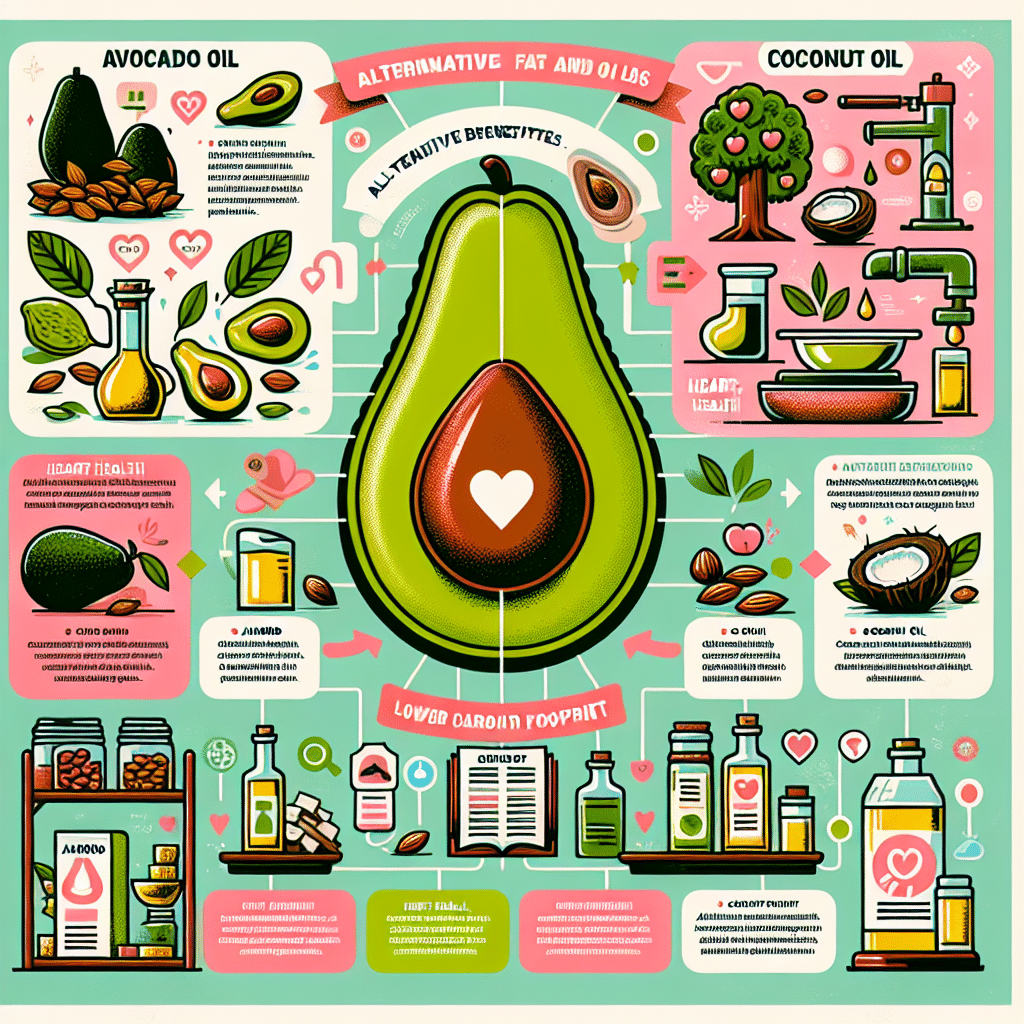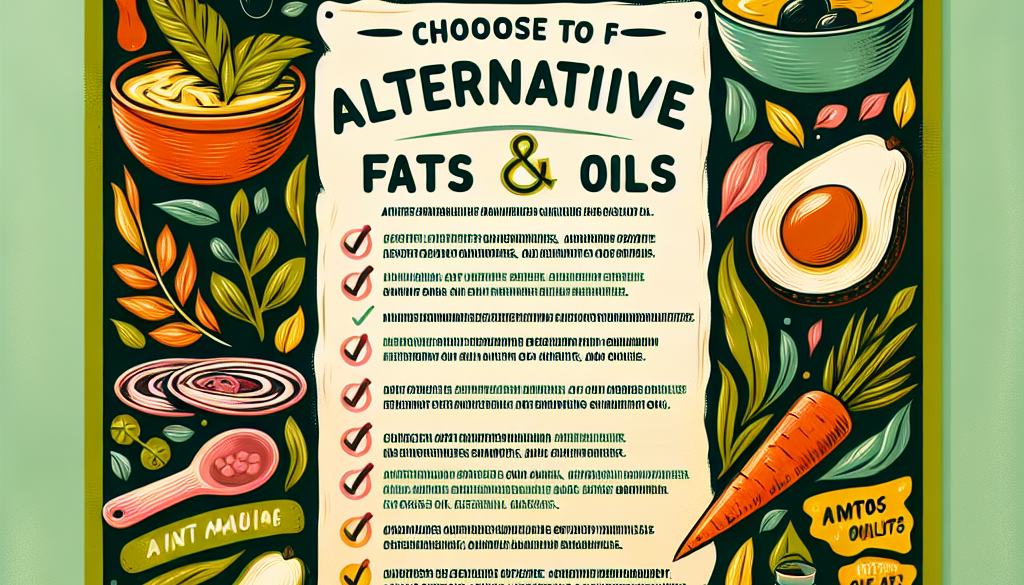Benefits of Alternative Fats and Oils for a Sustainable Choice
-
Table of Contents
- Unlocking the Potential of Alternative Fats and Oils for Sustainability
- The Rise of Sustainable Fats and Oils
- Health Benefits of Alternative Fats and Oils
- Environmental Benefits of Alternative Fats and Oils
- Economic and Social Benefits
- Challenges and Considerations
- Conclusion: Embracing a Sustainable Future with Alternative Fats and Oils
- Discover ETprotein’s Sustainable Protein Products
Unlocking the Potential of Alternative Fats and Oils for Sustainability

In recent years, the global community has become increasingly aware of the environmental and health impacts of traditional fats and oils. This awareness has sparked a growing interest in alternative fats and oils that are not only better for our health but also for the planet. These sustainable choices are gaining traction as consumers, manufacturers, and policymakers seek to reduce carbon footprints, conserve biodiversity, and promote overall well-being.
The Rise of Sustainable Fats and Oils
Alternative fats and oils come from a variety of sources, including plants, algae, and even lab-grown cultures. They are designed to be more sustainable than traditional options like palm oil, which has been linked to deforestation, and animal fats, which have a higher environmental impact due to livestock farming.
Health Benefits of Alternative Fats and Oils
- Improved Nutritional Profile: Many alternative oils are high in essential fatty acids, such as omega-3 and omega-6, which are crucial for heart health and cognitive function.
- Lower in Saturated Fats: Plant-based oils generally have lower levels of saturated fats compared to animal fats, reducing the risk of heart disease.
- Rich in Antioxidants: Some alternative oils, like those derived from seeds, are rich in antioxidants that protect the body from oxidative stress.
Environmental Benefits of Alternative Fats and Oils
- Reduced Deforestation: Sustainable oils often come from crops that do not require large-scale clearing of forests, helping to preserve habitats and biodiversity.
- Lower Greenhouse Gas Emissions: The production of plant-based oils typically results in lower emissions compared to animal fat production.
- Conservation of Water Resources: Many alternative oil crops are drought-resistant or require less water than traditional oilseed crops.
Economic and Social Benefits
- Support for Small Farmers: Alternative oil production can provide new opportunities for small-scale farmers, including those in developing countries.
- Job Creation: The growing industry around sustainable oils is creating jobs in agriculture, manufacturing, and research.
- Strengthening Local Economies: By investing in alternative oil production, communities can diversify their economies and reduce dependence on imported oils.
Challenges and Considerations
While the benefits of alternative fats and oils are clear, there are challenges to their widespread adoption. These include consumer acceptance, the need for infrastructure development, and ensuring that production methods are truly sustainable. It is crucial to address these challenges through education, investment, and transparent supply chains.
Conclusion: Embracing a Sustainable Future with Alternative Fats and Oils
The shift towards alternative fats and oils is not just a trend; it’s a necessary step towards a more sustainable and healthy future. By choosing these options, we can enjoy the health benefits, support environmental conservation, and contribute to economic and social development. As consumers, we have the power to drive this change by demanding sustainable products and supporting responsible companies.
Discover ETprotein’s Sustainable Protein Products
In line with the pursuit of sustainability, ETprotein offers a range of organic bulk vegan proteins that complement the use of alternative fats and oils in creating healthier and more eco-friendly food options. Their products, including various plant-based proteins and L-(+)-Ergothioneine, are perfect for those looking to enhance their offerings with high-quality, sustainable ingredients.
About ETprotein:
ETprotein, a reputable protein and L-(+)-Ergothioneine (EGT) Chinese factory manufacturer and supplier, is renowned for producing, stocking, exporting, and delivering the highest quality organic bulk vegan proteins and L-(+)-Ergothioneine. They include Organic rice protein, clear rice protein, pea protein, clear pea protein, watermelon seed protein, pumpkin seed protein, sunflower seed protein, mung bean protein, peanut protein, and L-(+)-Ergothioneine EGT Pharmaceutical grade, L-(+)-Ergothioneine EGT food grade, L-(+)-Ergothioneine EGT cosmetic grade, L-(+)-Ergothioneine EGT reference grade and L-(+)-Ergothioneine EGT standard. Their offerings, characterized by a neutral taste, non-GMO, allergen-free attributes, with L-(+)-Ergothioneine purity over 98%, 99%, cater to a diverse range of industries. They serve nutraceutical, pharmaceutical, cosmeceutical, veterinary, as well as food and beverage finished product distributors, traders, and manufacturers across Europe, USA, Canada, Australia, Thailand, Japan, Korea, Brazil, and Chile, among others.
ETprotein specialization includes exporting and delivering tailor-made protein powder and finished nutritional supplements. Their extensive product range covers sectors like Food and Beverage, Sports Nutrition, Weight Management, Dietary Supplements, Health and Wellness Products, and Infant Formula, ensuring comprehensive solutions to meet all your protein needs.
As a trusted company by leading global food and beverage brands and Fortune 500 companies, ETprotein reinforces China’s reputation in the global arena. For more information or to sample their products, please contact them and email sales(at)ETprotein.com today.












